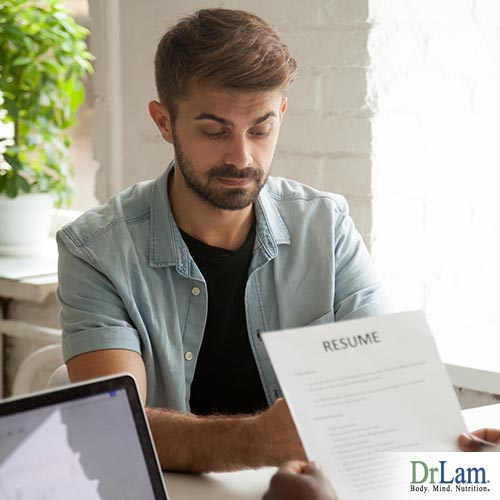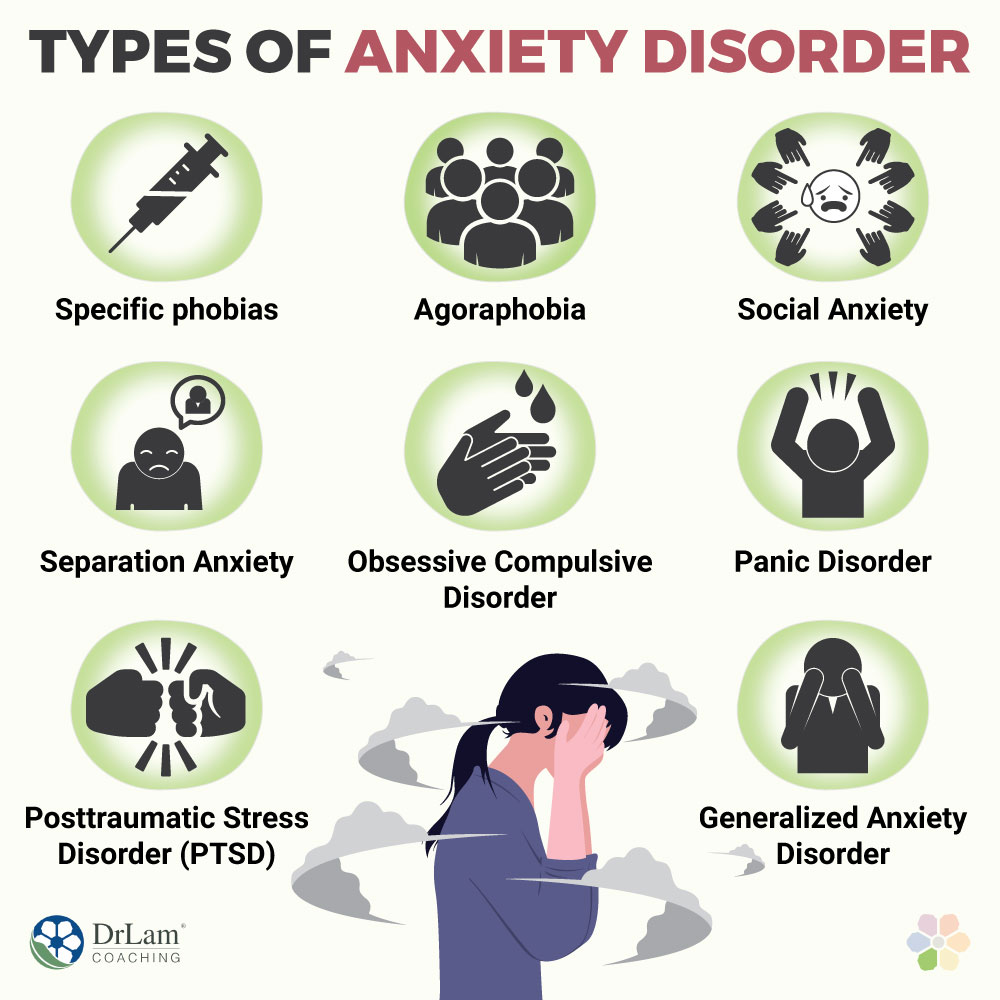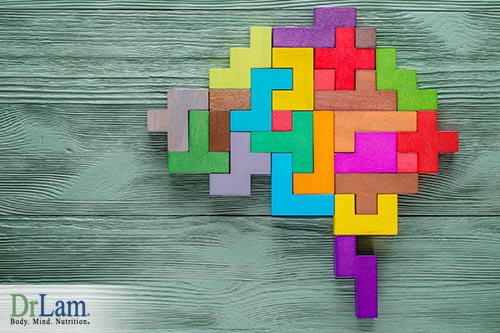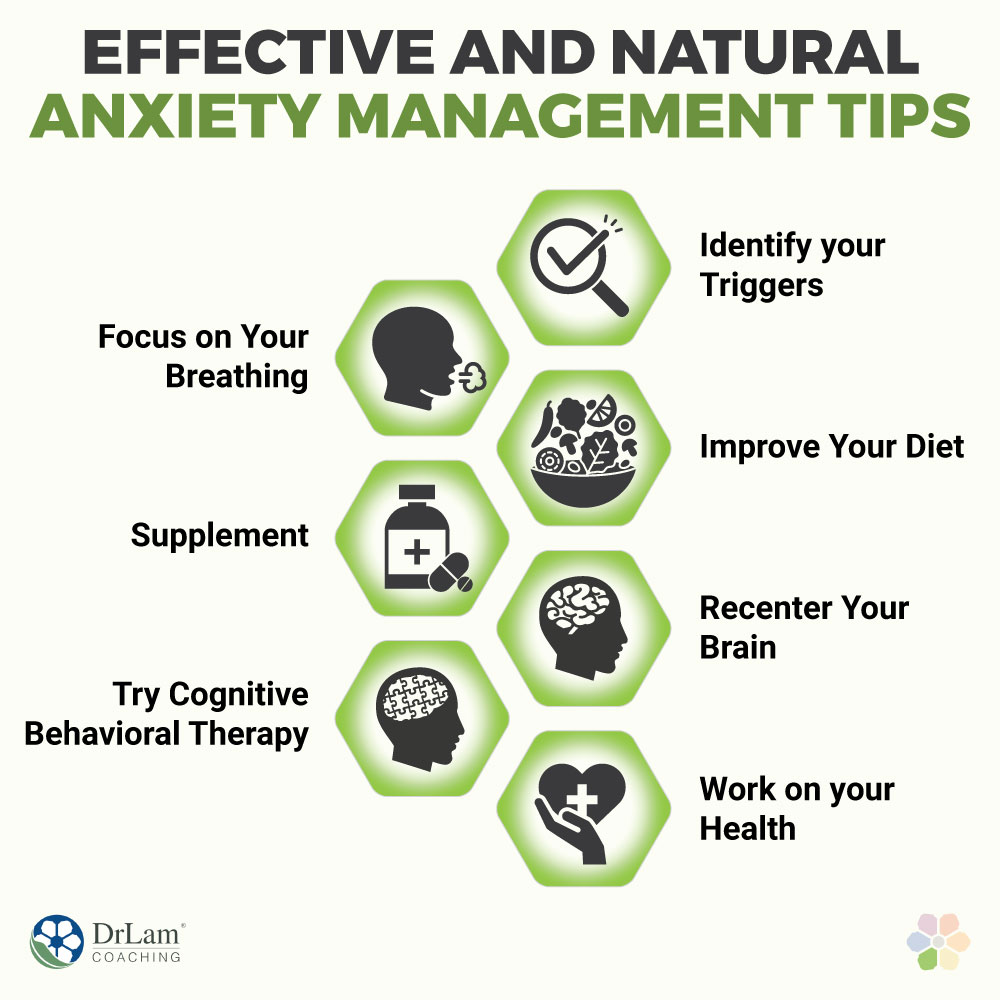 No one really understands how anxiety can take you over in a flash, as though you were possessed, unless they also suffer from anxiety. People who try to help can actually make things worse by telling you to calm down (as if there was an off button) or by trying to show you that there’s nothing to be so anxious about (“oh, so you’re saying I’m crazy?”). However, there are real, actually helpful methods for more effective and natural anxiety management. These will help you take back control of your life and start living it free of fear again.
No one really understands how anxiety can take you over in a flash, as though you were possessed, unless they also suffer from anxiety. People who try to help can actually make things worse by telling you to calm down (as if there was an off button) or by trying to show you that there’s nothing to be so anxious about (“oh, so you’re saying I’m crazy?”). However, there are real, actually helpful methods for more effective and natural anxiety management. These will help you take back control of your life and start living it free of fear again.
Anxiety can take many different forms, but the important thing to understand is that there’s a big difference between suffering from occasional anxiety and having an anxiety disorder. Anxiety that is not rooted in a disorder is a momentary state that can be caused by a stressful event or a physical illness. It can be dealt with by addressing the cause or by using anxiety management techniques.
This is quite different from an anxiety disorder. If you have an anxiety disorder then your worrying and fear affects every aspect of your life. It stops you doing things you want or need to do and is incredibly debilitating and all encompassing. Even if you experience recurrent anxiety, you still may not have an anxiety disorder and just need to learn a few anxiety management skills. But if you feel that your anxiety has become serious and pervasive, negatively affecting your quality of life, you may be suffering from an anxiety disorder. You should see a mental health professional if this is the case to learn expert skills and techniques to overcome this barrier.
There are several types of anxiety disorders, each one with different triggers, cycles, and management practices. These include:
Although we are going to give you some tips and tricks on reducing anxiety naturally, if any of the above resonates and you think you may be suffering from a full-blown anxiety disorder, it is best to seek professional help.
Remember this: whatever the case, you are not alone. Anxiety and anxiety disorders are some of the most common psychological problems the modern Westerner faces, and thankfully there are many resources available to help with coping. You don’t have to live under its curse. Whether you choose professional help or try natural anxiety management strategies, you have options.

The terms stress and anxiety are thrown around a lot these days, and some people use them interchangeably. But the fact is that they are actually quite different, even if they have similar physical sensations.
Stress is a response to a stressor – whether physical, like an accident or pathogen, or psychological, like a heavy workload or a fight with a spouse. Anxiety is a reaction to the stress. It is one possible outcome of stress. Think of it as a next possible point down the line, but thankfully it is not the inevitable next point down the line.
There is no avoiding exposure to stress. And in fact, not all stress is bad. Eustress, or “good” stress, can actually be beneficial. For example, a little physical eustress, like you’d experience when working out, is what helps you build more muscle or get your heart pumping. Psychological eustress can come from taking on a challenging project, which can sharpen your mind and make you feel more fulfilled than you do when your work is routine.
 It’s only when stress becomes too intense or chronic that it can cause a lot of harm. Certain types of stressors should be avoided as much as possible, such smoking cigarettes or being in an abusive relationship. On the other hand, other types of stress can’t be avoided, like relationship or financial strain, so you have to learn how to cope with them in healthy, positive ways.
It’s only when stress becomes too intense or chronic that it can cause a lot of harm. Certain types of stressors should be avoided as much as possible, such smoking cigarettes or being in an abusive relationship. On the other hand, other types of stress can’t be avoided, like relationship or financial strain, so you have to learn how to cope with them in healthy, positive ways.
Anxiety is one of the outcomes of not being able to cope with stress in a healthy, positive way. That is good news because it means your anxiety levels will naturally reduce as you get better at managing the stress in your life. And you can do this by practicing anxiety management techniques.
Stressful physical and psychological conditions can also cause anxiety, whether that comes in the form of worry about your condition or poor general health. This means that you need to address these conditions with anxiety management techniques if you want to reduce your anxiety. One example of this type of condition is Adrenal Fatigue Syndrome (AFS), which includes anxiety and mild depression as common symptoms.
AFS is the dysregulation of the adrenal glands, which produce the body’s main anti-stress hormone, cortisol. The main cause of AFS is chronic stress and its primary symptom is fatigue. Other symptoms include sleep disturbances, weight and appetite issues, food and drug sensitivities, PMS, infertility, an inability to handle stress, and heart palpitations. Any of these symptoms can trigger or add to high anxiety levels.
 When the adrenal glands become dysregulated, the rest of the NeuroEndoMetabolic (NEM) Stress Response starts to malfunction and breaks down. The NEM is the body’s global response to stress, and if it’s not functioning at optimum levels, you’re at risk of developing anxiety as a response to the unaddressed stress. When released in high levels, the hormones associated with stress, such as the “fight or flight” chemicals, can cause the heart to race and breathing to become shallow. This can create sensations associated with anxiety and worsen the original condition.
When the adrenal glands become dysregulated, the rest of the NeuroEndoMetabolic (NEM) Stress Response starts to malfunction and breaks down. The NEM is the body’s global response to stress, and if it’s not functioning at optimum levels, you’re at risk of developing anxiety as a response to the unaddressed stress. When released in high levels, the hormones associated with stress, such as the “fight or flight” chemicals, can cause the heart to race and breathing to become shallow. This can create sensations associated with anxiety and worsen the original condition.
The primary symptom of adrenal fatigue is a drop in energy levels, which is why sufferers often experience ongoing fatigue. When you’re tired constantly, you’ll find it more difficult to function at your best at work and at home. This will create additional stress as you struggle to perform everyday tasks to your normal levels. Your daily life will take a lot more effort than usual, possibly making you feel frustrated, frightened, and guilty about your declining performance. This tangle of feelings will cause additional stress and anxiety, worsening your adrenal fatigue and making your condition all the more precarious.
There is also the chemical component to this, which is even more evident as you reach the more advanced stages of AFS. In AFS, adrenaline and norepinephrine imbalances are big influences on anxiety and can cause the heart to race, force increases in blood pressure, make you breathe faster, and cause other changes that will aggravate your anxiety.
This bad combination of chemical imbalances and anxiety symptoms will only confuse the issue. It may leave you feeling more anxiety about your chances of recovery and the obstacles in your way. Understanding that AFS recovery takes time, and is sometimes a little confusing and tricky can give you the patience required to face the road ahead.
It can help to know that there is a way out. You need a highly individualized plan that takes into account your personal physical health and any conditions you have as well as your diet, lifestyle, and mental health. You will obviously need a lot of help and support in putting this plan together and implementing it, which is why it’s important that you seek out expert medical assistance from someone who can untangle the various issues clouding your physical, mental, and emotional health. Effective, natural anxiety management techniques should be a part of this program. They will help ensure that your anxiety doesn’t interfere with your recovery process and lower your overall stress levels, which will give your adrenal glands space to heal themselves.

The first and most important thing to do before trying any of the following anxiety management techniques is to shift your mindset and realize that not all anxiety is bad, though it can sometimes feel that way. Anxiety is a protective mechanism and sometimes it’s the right reaction to a threat. For example, if you’re in a dangerous situation, your anxiety is alerting you to the risks you’re facing and it may even motivate you to seek help and get out of the dangerous situation.
So, don’t make an enemy out of anxiety. As you know, what you resist persists, and that’s the last thing you want. Instead, try to understand your anxiety, and work with it rather than against it with the following ideas:
Working out what triggers your anxiety is the most important anxiety management technique. This gives you more control over your anxiety and your reaction to it. You can then limit your exposure or completely eliminate that trigger from your life if possible.
One of the quickest and most effective ways to stop anxiety, and even panic attacks, is to change your breathing. You will notice that with anxiety and panic attacks, your breathing becomes shallow and rapid. Slowing down and deepening your breathing is the natural antidote. Adrenal breathing is one such exercise that is very beneficial for calming your body down.
Dietary deficiencies and unhealthy, processed foods can basically poison your body, damaging your overall health, causing stress, and worsening your adrenal fatigue. If you have anxiety, this combination of negative effects will definitely make it worse. That’s why you need to make the change to a healthy diet based on whole foods that give your body everything it needs to function at its best.
Feeling tactile sensations using water or ice can help divert attention away from the anxiety and panic and make you focus on your body. Try putting a piece of ice in the palm of your hand or sliding it over your neck and forehead. Focus all of your attention on the feeling of the temperature and moisture, tracing the way it is slowly melting on your skin.
Jumping into the shower can also be very useful, and even more so if you can change the temperature of the water once you’re in there, going from hot to warm to cold, for example, and once again focusing on how it feels on your skin.
Even jumping up and down in place, or running the fingers of one hand carefully along the outline of your other hand can help. It gets you grounded and returns you to the moment.
If you can take supplements without paradoxical reactions, then there are several that can be helpful in reducing anxiety. Just make sure that you talk to your doctor about these supplements before taking them to avoid negative effects. Some effective supplements for anxiety management are:
Engaging both sides of your brain is another effective anxiety management technique. This can be done with simple crossover exercises. Here’s how to do an easy but effective crossover exercise:

Cognitive Behavioral Therapy (CBT) can be very helpful when you have anxiety. It can teach you to identify problem thoughts and behaviors related to anxiety and change the underlying patterns. A qualified therapist can help you work out if this anxiety management technique is right for you.
Getting and staying healthy is absolutely the best and most effective anxiety management strategy. This means improving your sleeping patterns, staying connected to people who love you and can help you, having meaningful pursuits in your life and other factors that improve every aspect of your physical and mental health. This is probably the most difficult strategy at first, but it’s also the most rewarding in the end.

These tips are for anxiety management in the moment, but you also need to adopt a lifestyle that is geared towards relaxation and wellbeing. Taking care of your physical and mental health are not luxuries in this day and age, they are necessities. You can do this by:
If you want help identifying anxiety management techniques that work for you, then contact our team on +1 (626) 571-1234 or click here to use the Ask The Doctor system.
Although it can be scary and difficult to deal with, if you focus on breathing, getting back into your body, and using both sides of your brain for reducing anxiety naturally, you’ll get relief without all the side effects of medication. Omega 3 and other supplements can help sometimes as well, but there are cases where your body needs the medication. Make sure you talk things over with your doctor to determine what works best for you.
